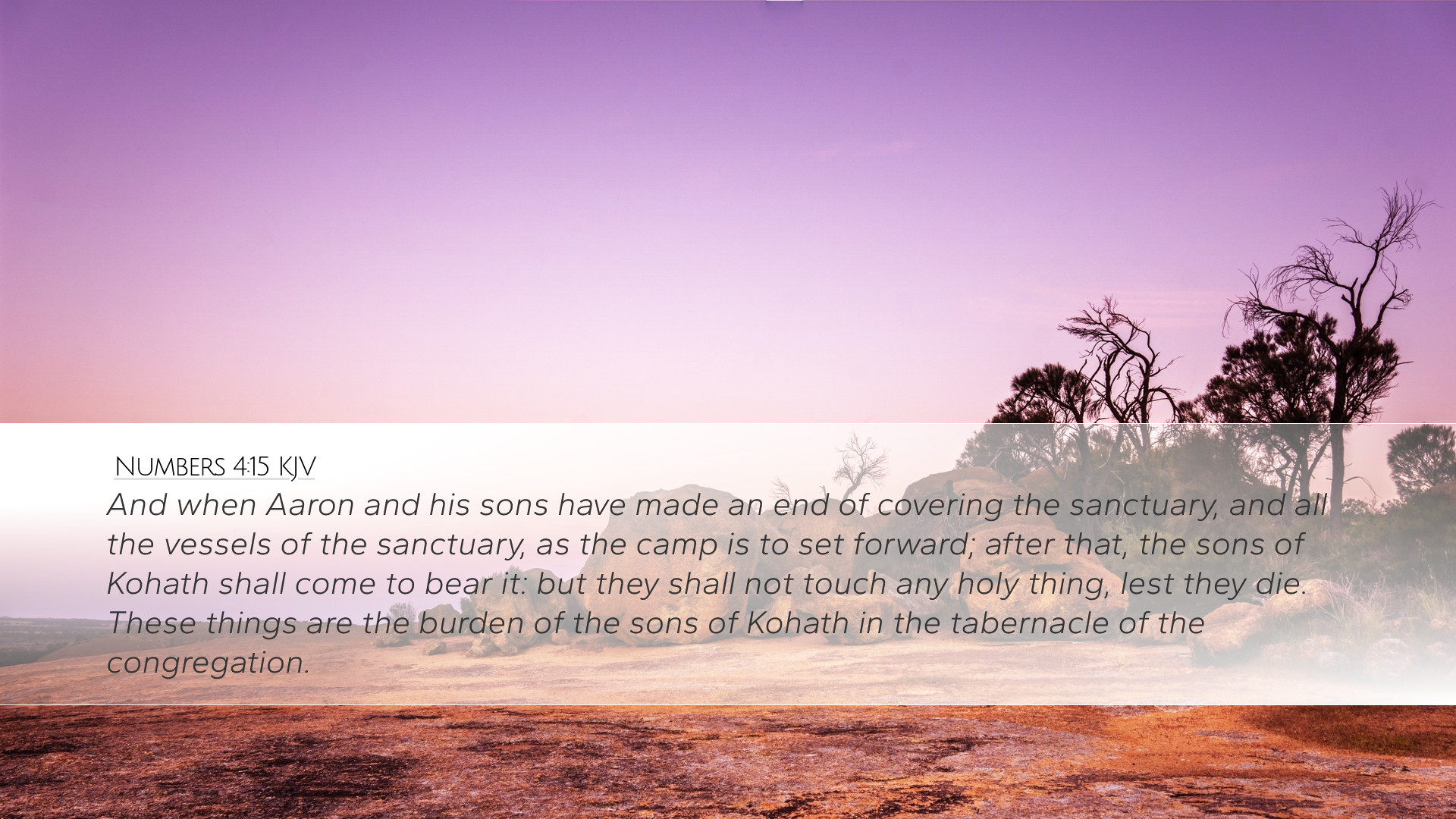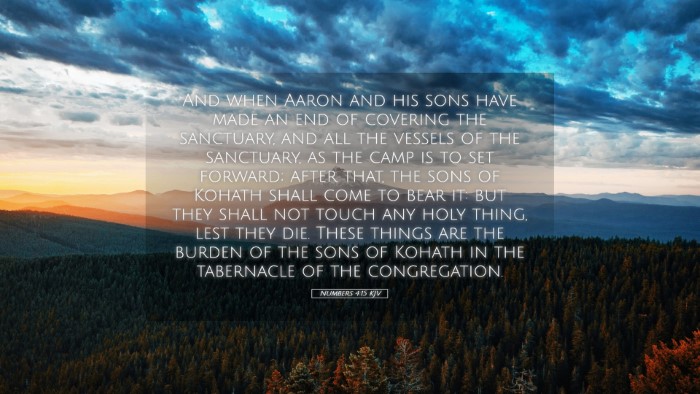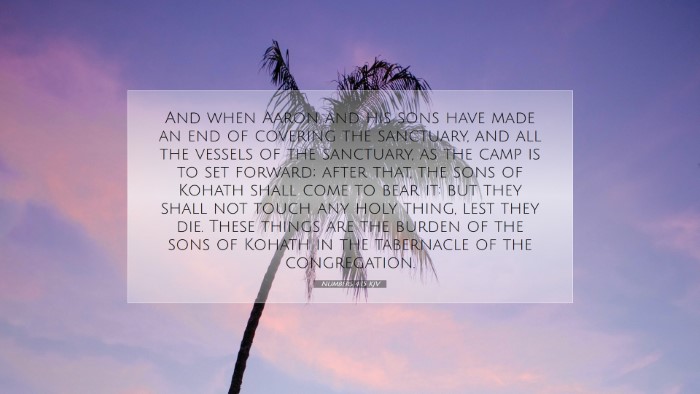Bible Commentary on Numbers 4:15
Verse Context: In Numbers 4:15, the focus is on the duties and responsibilities assigned to the descendants of Kohath, one of the sons of Levi. This verse specifically addresses the handling and care of the sacred items within the tabernacle, which were considered holy and critical to the worship of God.
Summary of Public Domain Commentaries
Matthew Henry Commentary
Matthew Henry emphasizes the sacredness of the items associated with the tabernacle and highlights the privilege and weight of responsibility carried by the Kohathites. He notes the following key insights:
- The Significance of Service: Henry states that the service of the Kohathites was not to be regarded as a burdensome task but a honored duty that brought them closer to God’s presence. Their role was crucial for maintaining the sanctity of the tabernacle.
- Divine Order: He points out that God, in His wisdom, established order among His people, specifying roles and delineating responsibilities. This reinforces the idea that God is a God of order, and His directives should be honored.
- Preparation is Key: The need for careful preparation before handling holy things is highlighted, underlining that irreverence in approaching God’s sacred items could lead to severe consequences.
- God’s Protection: Henry elaborates on the notion that God's instructions for how to cover and carry the sacred items served not only to dignify the items but also to protect the community from potential spiritual harm.
Albert Barnes Commentary
Albert Barnes provides a more technical exposition of the verse, focusing on the cultural and procedural context of the Kohathites’ responsibilities:
- Detailed Instructions: Barnes underscores the specificity of the instructions given to the Kohathites, reflecting God's meticulous attention to the reverence owed to His sanctuary. The mention of covering the holy things before the Kohathites could approach is significant, illustrating a practice of profound respect.
- Holiness of God: He emphasizes that the sanctuary represents the holiness of God, and because of this holiness, handling the sacred objects required serious forethought and care, reminding worshippers of the seriousness of approaching God.
- Role in Worship: The Kohathites served a vital role in the worship practices of Israel, and their tasks were intertwined with the overall approach to worship, embodying a recognition of God's presence amongst His people.
- Consequences of Impropriety: Barnes also notes that the consequences of not adhering to God’s specifications could be dire, evidenced by historical accounts in which improper handling resulted in death, showcasing God's holiness and justice.
Adam Clarke Commentary
Adam Clarke offers a comprehensive analysis by diving into the historical implications as well as theological reflections:
- Typology of Christ: Clarke draws parallels between the tasks of the Kohathites and the redemptive work of Christ. He posits that just as the Kohathites were responsible for the sacred objects that facilitated worship, Christ mediates the new covenant, where believers are called to come boldly to the throne of grace.
- Symbolism of Coverage: He elaborates on the symbolic aspect of the “covering” of holy items, suggesting it illustrates the need for reverence and an understanding of obedience within spiritual service, drawing on the importance of spiritual preparation.
- Lessons in Obedience: Clarke emphasizes the broader lesson of obedience to divine commandments, insinuating that believers should learn from the dedication and carefulness of the Kohathites in fulfilling their divine calling.
- Spiritual Application: He concludes with an application focus, encouraging believers to recognize the weight of their responsibilities in spiritual leadership and service, aligning their actions with the sacredness reflected in the tabernacle’s design and purpose.
Theological Implications
As we reflect on Numbers 4:15, several theological implications emerge that resonate deeply with pastoral work, scholarship, and personal worship:
- The Nature of Holiness: This verse serves as a profound reminder of the holiness of God and the reverence with which we are to approach Him. For pastors and theologians, it raises questions about how contemporary church practices might embody or neglect this principle.
- Accountability in Ministry: Students of theology can glean insights about the nature of divine service and the accountability that comes with spiritual authority. The assigned roles within the Levi's lineage serve as a reminder of the importance of fulfilling one's God-given responsibilities with integrity.
- Impact on Worship Practices: This commentary invites scholars to consider how the principles laid out in this passage might inform modern worship practices and the treatment of sacred spaces within Christian communities.
- Jesus as the Fulfillment: The connection drawn between the Kohathites' service and Christ’s sacrificial role enhances the understanding of Jesus as the embodiment of true holiness and serves as a model for believers on how to live out their faith.
Conclusion
Numbers 4:15 encapsulates vital lessons not only about responsibility and reverence within the context of worship but also speaks to the broader narrative of redemption through Christ. The insights drawn from the commentaries by Matthew Henry, Albert Barnes, and Adam Clarke offer a multifaceted understanding for pastors, theologians, and scholars, encouraging an earnest reflection on their role within the sacred community of believers.


